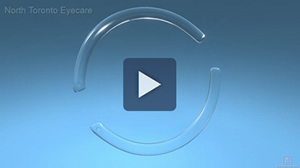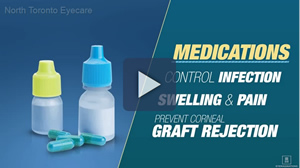Treatment
In the early stages of keratoconus, glasses or soft contact lenses may help to correct the nearsightedness and astigmatism associated with the disease. As the condition progresses and the cornea becomes increasingly thin, more advanced treatment is required. Our experienced providers Dr. Rabinovitch and Dr. Lam specialize in the treatment of keratoconus.
Intacs®
in this procedure, thin prescription inserts are placed into the mid-layer of the cornea to flatten it. This in turn can help improve vision in patients with keratoconus as the cornea becomes less pronounced. The FDA-approved implants are removable and exchangeable– and may be needed when the distorted vision from keratoconus can no longer be corrected with contact lenses or eyeglasses. However, if the disease progresses, INTACS® cannot prevent the need for a corneal transplant. Learn more »
Collagen Cross-Linking
A non-invasive procedure that strengthens the corneal tissue to stop it from bulging. Eye drops containing riboflavin (vitamin B2) are applied to the cornea and then activated by ultraviolet light. This strengthens collagen fibers within the cornea, making it more rigid and able to resist weakening and bulging.
Corneal Transplant
Surgery is needed for patients with advanced keratoconus, where other therapies no longer provide clear vision. This usually occurs in 15-20% of cases. In corneal transplant surgery, most of the cornea is removed and then replaced with a new donor cornea. The results of the procedure have a success rate of over 97%.









